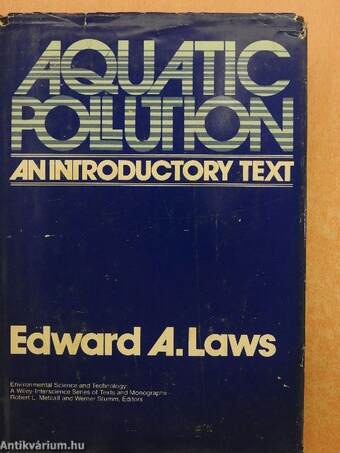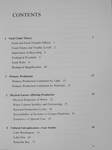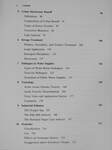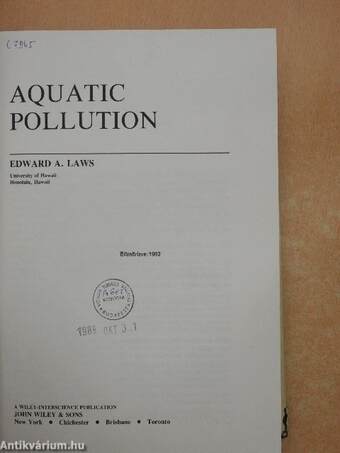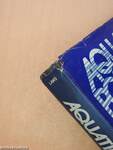1.118.174
kiadvánnyal nyújtjuk Magyarország legnagyobb antikvár könyv-kínálatát
Aquatic Pollution
An Introductory Text
| Kiadó: | John Wiley & Sons, Inc. |
|---|---|
| Kiadás helye: | New York |
| Kiadás éve: | |
| Kötés típusa: | Vászon |
| Oldalszám: | 482 oldal |
| Sorozatcím: | Wiley-Interscience |
| Kötetszám: | |
| Nyelv: | Angol |
| Méret: | 24 cm x 17 cm |
| ISBN: | 0-471-05797-5 |
| Megjegyzés: | Fekete-fehér ábrákkal illusztrálva. |
naponta értesítjük a beérkező friss
kiadványokról
naponta értesítjük a beérkező friss
kiadványokról
Fülszöveg
Too often, courses on aquatic poliution are taught with a reading list comprised largely of scientific journal articles and various chapters from books. Since some students find journal articles too difficult to understand, and others simply fail to do the assigned reading, it is obvious that the available reading material is less than satisfactory. With the publication of AQUATIC POLLUTION: An Introductory Text, this problem is finally resolved.
The text's use of introductory material reviewing basic knowledge and general ecological principles relevant to water pollution and toxicology will enablethe prospective reader to fully appreciate the issues and dilemmas involved in the broad subject of water pollution. Such topics as eutrophication, pesticides, metals, and radioactivity are emphasized, since these types of pollution require a fundamental understanding to be fully appraised, and also are of special concern today.
Because water pollution is a controversial subject that... Tovább
Fülszöveg
Too often, courses on aquatic poliution are taught with a reading list comprised largely of scientific journal articles and various chapters from books. Since some students find journal articles too difficult to understand, and others simply fail to do the assigned reading, it is obvious that the available reading material is less than satisfactory. With the publication of AQUATIC POLLUTION: An Introductory Text, this problem is finally resolved.
The text's use of introductory material reviewing basic knowledge and general ecological principles relevant to water pollution and toxicology will enablethe prospective reader to fully appreciate the issues and dilemmas involved in the broad subject of water pollution. Such topics as eutrophication, pesticides, metals, and radioactivity are emphasized, since these types of pollution require a fundamental understanding to be fully appraised, and also are of special concern today.
Because water pollution is a controversial subject that often involves a conflict between the need for economic growth and preservation of the environment, the book addresses this problem by presenting both sides of the environmental question. Thisapproach focuses attention on two major facts: that some forms of pollution, such as wastewater, when properly managed, actually represent valuable resources; and that pollution control usually involves a trade-off between environmental conservation on the one hand, and industrial/agricultural growth on the other. The examples of water pollution include many case studies that serve to illustrate the practical application of principles presented in the text; the severity and complexity of various water pollution problems; methods that have been used to deal with water pollution successfully; and the inadequacy or failure of government policy to combat water pollution.
Students interested in environmental issues will be enriched by the book's comprehensive coverage of numerous water pollution subjects, as well as its didactic introductory material and background information. The myriad case studies and extensive bibliography that appear in this text will provide environmental scientists and government
(continued from front flap)
administrators with an informative reference source, and, above all, a much more realistic understanding of water pollution than would be possible from a discourse on fundamental knowledge and principles alone. 812 Vissza
Témakörök
- Idegennyelv > Idegennyelvű könyvek > Angol > Egyéb
- Idegennyelv > Idegennyelvű könyvek > Angol > Természettudományok > Biológia
- Természettudomány > Biológia > Ökológia, környezetvédelem > Környezetvédelem > Környezetszennyezés
- Természettudomány > Biológia > Ökológia, környezetvédelem > Ökológia > Víz
- Természettudomány > Biológia > Ökológia, környezetvédelem > Idegennyelvű
- Természettudomány > Biológia > Ökológia, környezetvédelem > Tankönyv
- Tankönyvek, jegyzetek, szöveggyűjtemények > Természettudományok > Biológia
- Tankönyvek, jegyzetek, szöveggyűjtemények > Természettudományok > Biológia > Felsőoktatási


